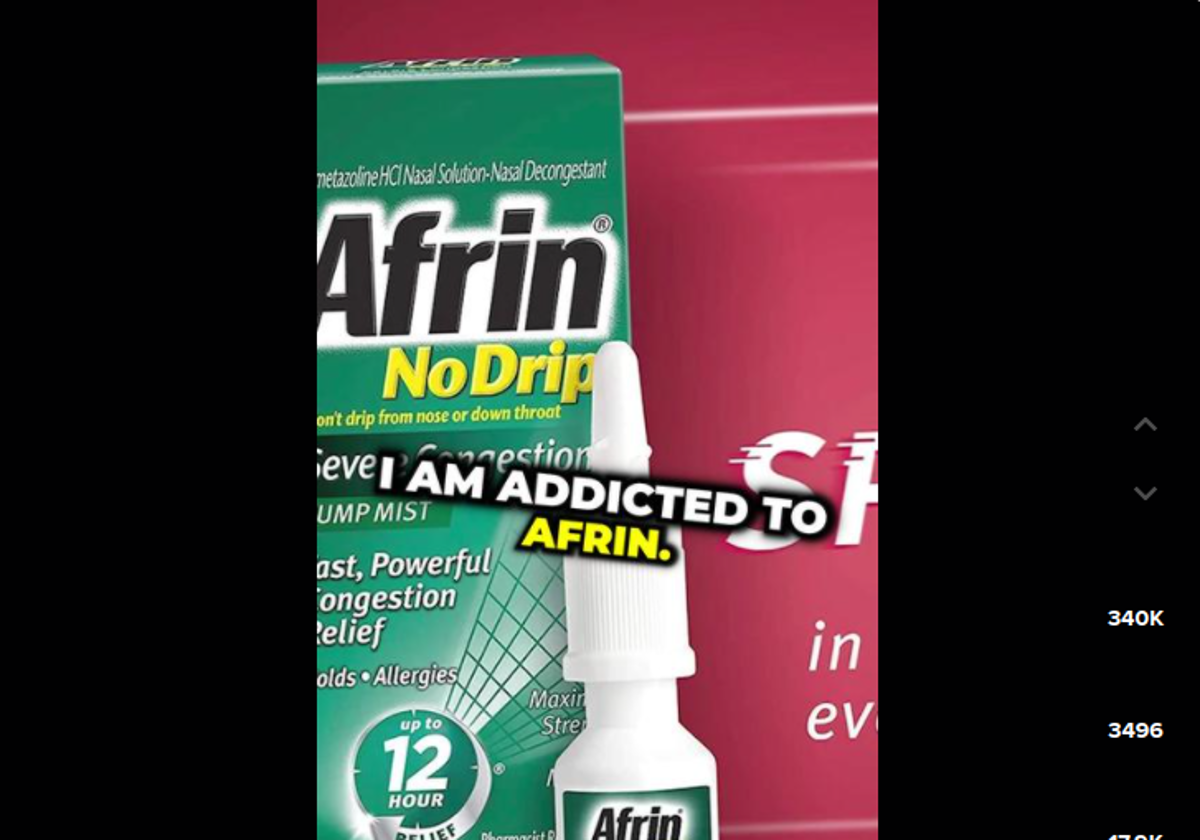
Is #AfrinAddiction a Thing? 800K Say Yes
What’s that you say? The phrase #AfrinAddiction is trending on TikTok? How can that be? Isn’t Afrin sold over-the-counter? And aren’t over-the-counter drugs supposed to be safe? So how can people be getting addicted to nasal spray?
You’ve got questions. We get it. Heck, we had questions too. Lots and lots of questions. Especially after reading beyond the headline “Some OTC Drugs Can Be Habit-Forming So Be Careful When Taking These”. Fortunately, BuzzFeed News Contributor Amanda Gardner answered most of those questions, but not before scaring the proverbial bejesus out of us.
Is nothing safe anymore?
Gardner’s story seems to say both Yes and No. That’s not her fault though. It’s just the way the questions answered. Gardner got those answers from some exemplary sources too.
Among those sources was Pat Aussem, who serves as associate vice president of consumer clinical content development at the Partnership to End Addiction.
A Question of Misuse
So called #AfrinAddiction seems to spring about from misuse. Or, as Aussem explains, “when a person takes more of the medication than prescribed on the label, for a longer period of time, more often than what is recommended, or is using it for a purpose other than what was intended.”
In other words, when folks don’t follow directions. Or worse.
In Afrin’s case, those directions are there for damn good reason.
“When Afrin is used for longer than three days, it can cause a chemical imbalance in the body…” says National Capital Poison Center Dr. Kelly Johnson-Arbor, “[and] that actually results in worsening nasal stuffiness when Afrin is discontinued.”
This leads to a vicious cycle – first, using Afrin to fight decongestion; then puffing away to address recongestion. It apparently happens a lot. Well, enough so that it’s considered a condition anyway. It’s even got a medical name: rhinitis medicamentosa.
But nasal stuffiness, congestion, and pain aren’t the only joys brought about by Afrin misuse and abuse. It can also lower blood pressure and heart rate, leading to dizziness or fainting.
Dr. Johnson-Arbor says things can get so bad that “doctors sometimes prescribe steroids to lessen the discomfort of quitting Afrin.”
Sounds like #AfrinAddiction to us.
#AfrinAddiction
What about this so-called #AfrinAddicition anyway? And why is it trending?
We came about the 800K TikTok stat via BuzzFeed News’ Gardner. Gardner, in turn, may or may not have gotten tipped off by someone named George Resch, aka TankSinatra, who bam-bam-bammed about it all on his podcast, Meme Daddies.
“I AM ADDICTED TO AFRIN.”
Bam!
“I CAN’T BELIEVE THAT IT’S LEGAL AND THEY SELL IT OVER THE COUNTER.”
Bam! Bam!
“NOBODY SHOULD BE USING AFRIN PERIOD. HANDS DOWN.”
Bam! Bam! Bam!
Then TankSinatra really went at it.
“There’s a chemical in it called oxymetazoline that binds itself to the receptors in your nose and inflames the nasal lining.” said the cigar-chomping co-host. “Even when you’re not congested from having a cold your nose is literally swollen shut and you can’t breathe without the Afrin.”
Billed as “a silly podcast about memes with Tank Sinatra ad Adam the Creator,” Meme Daddies is hardly the place to go to for medical advice. And TankSinatra is probably not the first person you wanna call regarding nasal problems either. But the man does say that “he’s been congested for over a year.” So either he’s not following directions or #AfrinAddiction is really a thing.
Perhaps it’s a good bit of both.
Misuse vs Addiction
Misuse may cause dependency, but, writes Gardner, it’s “not the same as true addiction.”
“A person who is misusing an OTC drug can develop a physical dependency on the drug, which means their body comes to rely on it for a particular function,” continues Gardner. “That isn’t the same as an addiction to a drug, which results in compulsive behavior to get the drug despite the sometimes devastating and even life-threatening repercussions.”
As you might suspect, Afrin isn’t the only risky OTC medication either. Problems can also arise from the misuse and/or overuse of headache remedies, be they aspirin, ibuprofen, naproxen, acetaminophen or anything else. So can cortisone creams used for rashes, sunburn, eczema and the like.
Heck, according to Gardner (and the American Academy of Ophthalmology) even Visine can be harmful if not taken wisely.
We recommend checking out Gardener’s article, so you can see for yourself just how fine a line there is between misuse and addiction. We also recommend heeding all OTC remedy instructions. Spare yourself the need to podcast about your #AfrinAddiction.